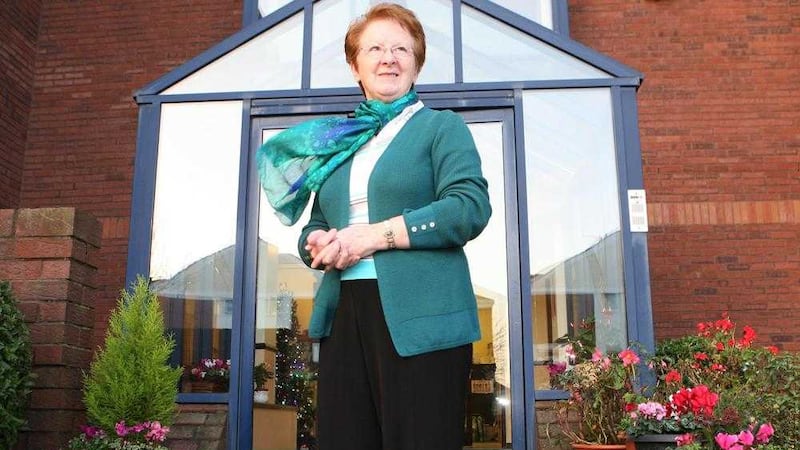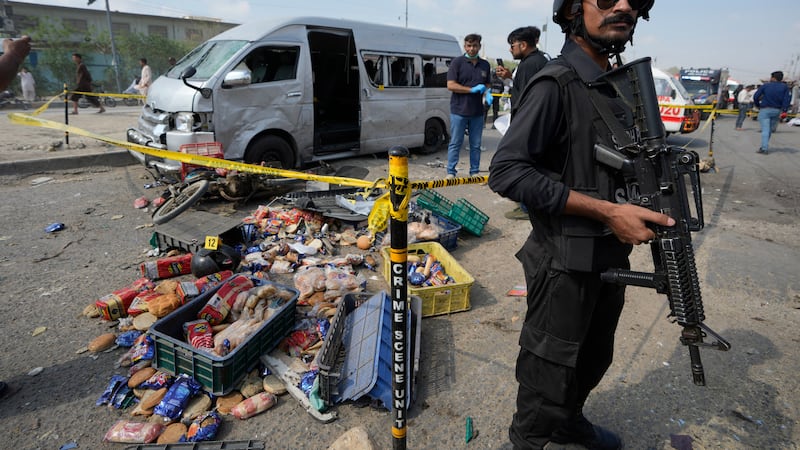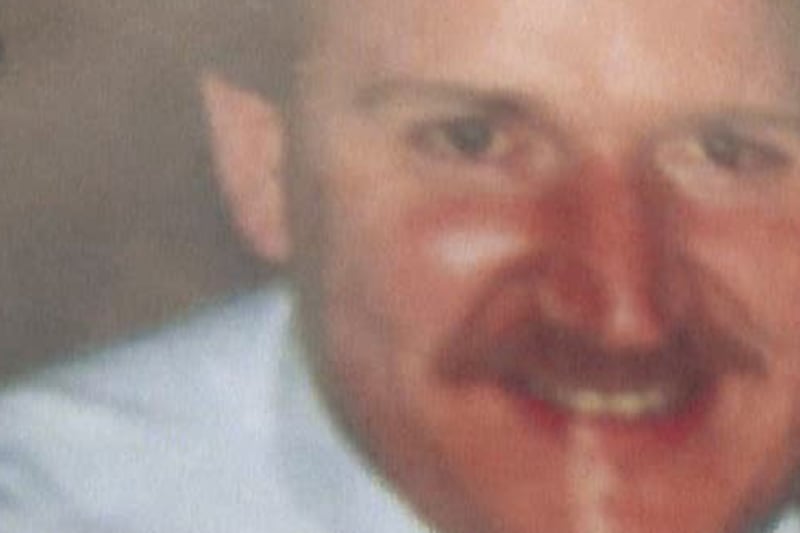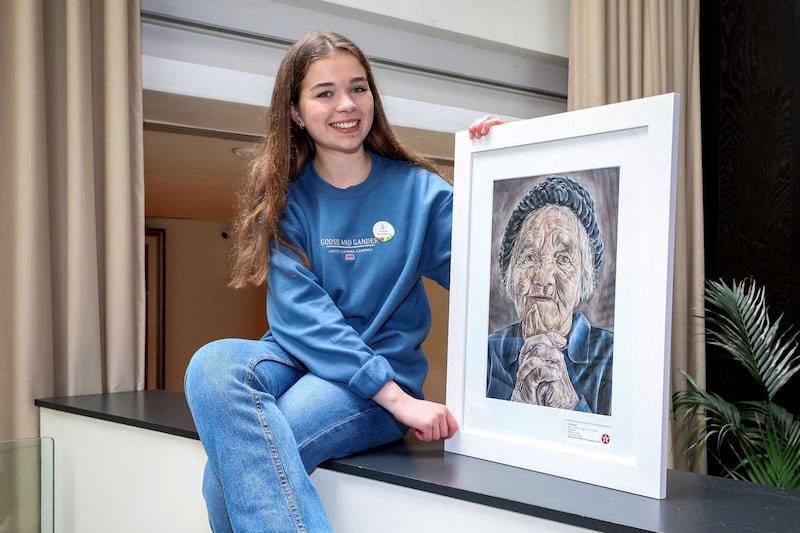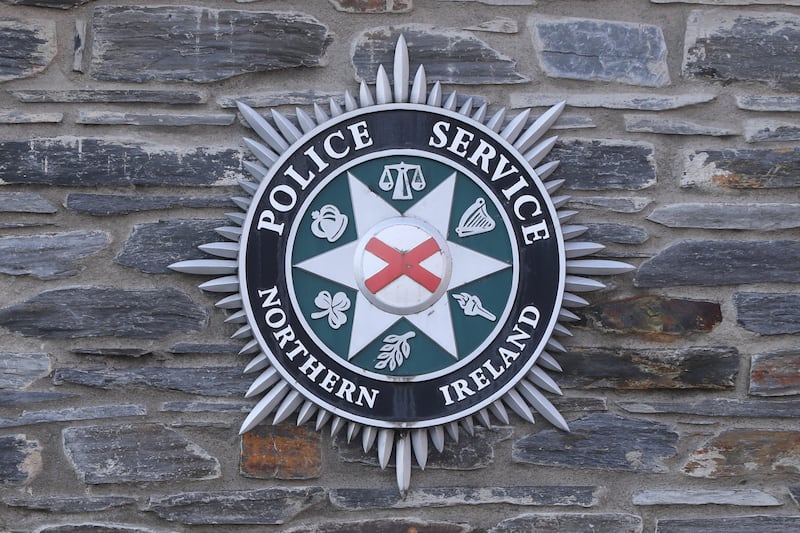BEING at the centre of attention does not sit comfortably with Sister Bernadette Healy.
Yet this modest woman fully deserves generous recognition. She is one of the unsung heroes, one of the quiet saints who sees her mission in simple terms: to serve others and put them first.
Or, as her congregation, the Marist Sisters, describe their work, to go to the places where no-one else wants to go and do the things that no-one else wants to do.
The confirmation that she will today from her post as manager of the hostel for homeless families with which she has become indelibly associated has brought forth a flurry of cards and gifts to go with the warm tributes paid to a woman who has made a positive difference in the lives of hundreds of people.
Sr Bernadette was dispatched to Belfast in 1993. The Housing Executive was building a new hostel on Grosvenor Road and the Marist Sisters had got the job of running it.
Sr Bernadette, recently returned from long service in Brazil, seemed the ideal woman to take on the challenge - or so the leader of her congregation told her.
"I wasn't so sure - what did I know about running a hostel? - but I thought I'd give it a go," she recalls.
When she arrived, building work at Grosvenor House Hostel was not yet complete but by the end of September 1993 its 17 units were full.
In some respects, Belfast was not that far removed from the Brazil Sr Bernadette had experienced.
"People would say to me that Belfast must have been very easy after Brazil," she says.
"It wasn't, though - the Troubles were still very much on, with bombs going off and so on. I found that very hard and the young families we were getting in had been through so much."
To underline her point, she talks about her memories of that hope-filled day in April 1998 when the Good Friday Agreement was signed.
"There was great excitement on the road, and four or five of the young residents said to me that this was the first time they had known peace," she says.
Every house she would visit in the cathedral parish "had someone still grieving or who would tell the story of people who had died".
"That was a reality it took me a long time to get used to," she explains.
"People's lives had been broken one way or another. I realised quickly there was more to learn in this culture than in Brazil."
It seems a remarkable statement, sitting in a cosy sitting room in the hostel in the twilight of 2015 and having just heard about what she got up to in Brazil in the 14 years she served there. Perhaps we are guilty of forgetting just what it was like on Grosvenor Road and countless other areas like it less than 20 years ago.
There was nothing easy about Brazil, of course. Sr Bernadette arrived in South America in 1978, a time when many governments in the continent were bywords for corruption, oppression and injustice. Brazil was no different.
Originally from Roscommon, Sr Bernadette had all but completed a hotel management course in Dublin when she decided to test the sense of vocation for religious life she had felt since school.
Her boss thought she was mad, and told her she would be back at the hotel within six months. But he had misjudged Sr Bernadette's strength of will and what she describes as the Lord's leading.
With nursing and midwifery training and several years working in hospitals under her belt, she was sent to Brazil as part of an international team, an outworking of the Second Vatican Council's call for religious to go into the world.
When she arrived at a hospital in the south of Brazil, she was appalled not only at the conditions and rampant corruption but also the number of premature babies dying.
"The doctors and nurses just left them to die. But we started training them and showing them how they could save these babies - they couldn't believe it," she says.
After five years, Sr Bernadette headed to the north of Brazil, where she found the Amazon and a diocese the size of Ireland, though with just 11 priests and fewer than 30 religious.
"There, I did a bit of everything," she says, though it quickly becomes apparent that "everything" does not quite capture the scope of her activity: establishing community pharmacies which dispensed homeopathic medicines made from the Amazon's plant and herbs; training church leaders; helping tackle illnesses like diarrhoea and even the common cold which routinely killed children; preparing couples for marriage; setting up an undertaker cooperative; working with prostitutes and Aids patients.
Overarching all this activity was fighting on behalf of people who had no land and houses. "It was a fight for justice," she says.
"It was an uphill battle because your life was threatened for speaking up. But the people were oppressed and you could not be there and not stand by them."
This was dangerous work. Phones were tapped, intimidation rife and Sr Bernadette had to smuggle community leaders to safety in the boot of her car.
She was even threatened at gunpoint, though she confesses to not being afraid. A young Italian priest she worked with was one of those who did die - "his body was like a pin cushion from bullet wounds" - and her bishop was fearless in denouncing the corruption and injustice.
"He was fantastic, out and about in his flip-flops, so close to the people and so courageous," she says.
"I knew a lot of Óscar Romeros," she says, referring to the beatified archbishop of El Salvador who was assassinated in 1980 for similarly speaking out against oppression.
Given this background, it is unsurprising that Sr Bernadette has a burning passion for social justice. She admires Pope Francis for his stance on these issues - "I would love to meet him and have a chat" - and says there is "lots of work to be done around social justice here too".
This is the thread that runs through Sr Bernadette's work in Brazil and Belfast.
Grosvenor House Hostel offers temporary accommodation for homeless families. "You have to have children to come here," she explains. "There are all sorts of reasons why people become homeless - the main ones we see here are intimidation and being forced out, domestic violence, family breakdown and addiction.
"We are all about supporting people in the sense that when they leave here we want them to be fit to live independently."
It does not always work out that way, of course.
"Our experience is sometimes that they leave this hostel and then six or 12 months later they are in another hostel," says Sr Bernadette.
"It can seem like a roundabout, with no exit. I believe that education and work are key to breaking the cycle of homelessness."
Family illnesses meant Sr Bernadette left the hostel in 2000. She was asked to return to Belfast in 2006, but only after stints in Dublin as a hospital chaplain and, most significantly for her, as a prison chaplain.
"Prison chaplaincy is one of the most necessary things to do. I know there are victims outside, but there are victims inside as well," she says.
"The prison possibly made me a bit more sensitive to the loneliness of people here."
It won't be easy leaving 'here' on January 4, Sr Bernadette admits, despite the 24/7 pressures that come from managing the hostel.
She is under orders to take a break and some holidays, and while she does not yet know what she will do next, she has the confidence that comes from having seen God's leading throughout her life.
"There are three things I would like to do if the Lord wants me, ideally in Belfast: to work with the homeless, with trafficked women or alcoholics," says Sr Bernadette.
"We don't really retire. We can all do something."
